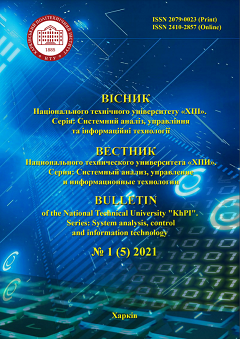THE LINEAR-FRACTIONAL PROGRAMMING PROBLEM UNDER UNCERTAINTY CONDITIONS
DOI:
https://doi.org/10.20998/2079-0023.2021.01.04Abstract
This paper addresses the problem of linear-fractional programming under uncertainty. The uncertainty here is understood as the ambiguity of the coefficients’ values in the optimized functional. We give two mathematical formulations of the problem. In the first one, the uncertainty refers to the numerator: there are several sets of objective function coefficients, each coefficient can determine the numerator of the problem’s criterion at the stage of its solution implementation. The uncertainty in the second formulation refers to the denominator of the functional. We propose several compromise criteria for evaluating solutions to the problem we consider. We study the following two criterions in detail: 1) finding a compromise solution in which the deviation of the values of the partial functionals from their optimal values is within the specified limits; 2) finding a compromise solution according to the criterion of minimizing the total weighted excess of the values of partial functionals in relation to the specified feasible deviations from their optimal values (the values of concessions). We formulate an auxiliary linear programming problem to find a compromise solution to the linear-fractional programming problems by these two criteria. The constraints of the auxiliary problem depend on the optimization direction in the original problem. We carried out a series of experiments of four types to study the properties of the problem. The purposes of the experiments were: 1) to study how changes in the values of the specified feasible deviations of partial objective functions impact the values of actual deviations and the values of concessions; 2) to study how changes in the expert weights of partial objective functions impact the values of actual deviations and the values of concessions for the compromise solutions we obtain. We propose in this work the schemes of experiments and present their results in graphical form. We have found that the obtained relations depend on the optimization direction in the original problem.
Keywords: optimization, uncertainty, convolution, linear-fractional programming, linear programming problem, compromise solution
References
Demidova L. А., Kirakovsky V. V., Pylkin А. N. Prinyatiye resheniy v usloviyakh neopredelennosti [Decision making under uncertainty]. Moscow: Goryachaya liniya – Telekom Publ., 2015. 283 p.
Rozenberg I. N. Upravleniye v usloviyakh neopredelennosti [Management in the face of uncertainty]. Sovremennyye tekhnologii upravleniya [Modern control technologies]. 2017. № 7 (79).
Ehrgott M. Multicriteria Optimization. Berlin: Springer, 2005. 323 р.
Poltavskiy A. V., Semenov S. S., Kryanev A. V., Maklakov V. V. Stokhasticheskoye dominirovaniye v usloviyakh riskovosti raznykh stepeney [Stochastic dominance in terms of riskiness of different degrees]. Trudy XII Vserossiyskogo soveshchaniya po problemam upravleniya [Proceedings of the XII All–Russian Meeting on Management Problems]. Moscow: IPU RAN Publ., 2014. P. 8101– 8124.
Bronevich F. H., Karkischenko А. N., Lepsky А. Е. Analiz neopredelennosti videleniya informativnykh priznakov i predstavleniy izobrazheniy [Uncertainty analysis of the vision of informative features and representations of images]. Moscow: FIZMATLIT Publ., 2013. 320 p.
Arefieva I. Y. Analiz metodov prinyatiya resheniy pri razrabotke slozhnykh tekhnicheskikh system [Analysis of decision–making methods in the development of complex technical systems]. Vestnik Sankt–peterburgskogo universiteta Ser [Saint Petersburg University Bulletin Ser. 10]. 2009. Ed. 4 P. 25–32.
Saati Т. Prinyatiye resheniy. Metod analiza iyerarkhiy [Making decisions. Hierarchy analysis method]. Moscow: Radio and communication Publ., 1993. 278 p.
Zaichenko Y. P. Nechetkiye modeli i metody v intellektual'nykh sistemakh [Fuzzy models and methods in intelligent systems]. Kyiv: Slovo Publ., 2008. 344 p.
Pavlov A. A. Optimization for one class of combinatorial problems under uncertainty. Adaptyvni systemy avtomatychnoho upravlinnya [Adaptive automatic control systems]. 2019, № 34. P. 81–89.
Pavlov A. A. Models and algorithms of multipurpose linear programming. Journal of Automation and Information Sciences. 2020. Vol. 52. Iss. 11. P. 48–59
Pavlov A. A, Zhdanova E. G. The Transportation Problem under Uncertainty. Journal of Automation and Information Sciences. 2020. Vol. 52, issue 4, pp. 1–13.
Wagner H. Osnovy issledovaniya operatsiy [Operations research fundamentals]. Moscow: Mir Publ., 1973, vol. 2. 489 p.
Downloads
Published
How to Cite
Issue
Section
License
LicenseAuthors who publish with this journal agree to the following terms:
- Authors retain copyright and grant the journal right of first publication with the work simultaneously licensed under a Creative Commons Attribution License that allows others to share the work with an acknowledgement of the work's authorship and initial publication in this journal.
- Authors are able to enter into separate, additional contractual arrangements for the non-exclusive distribution of the journal's published version of the work (e.g., post it to an institutional repository or publish it in a book), with an acknowledgement of its initial publication in this journal.
- Authors are permitted and encouraged to post their work online (e.g., in institutional repositories or on their website) prior to and during the submission process, as it can lead to productive exchanges, as well as earlier and greater citation of published work (See The Effect of Open Access).

